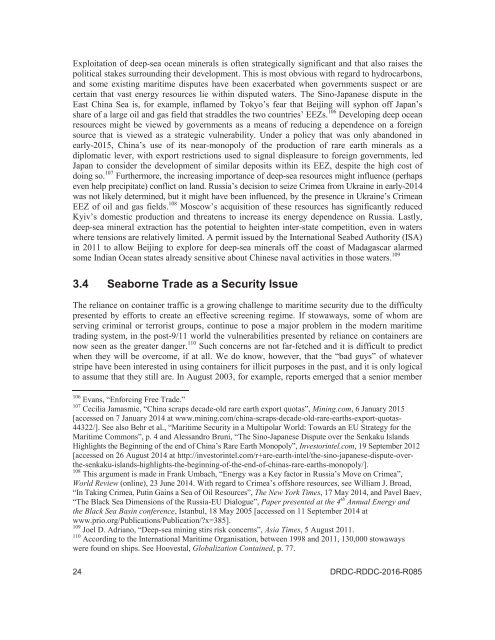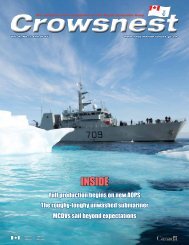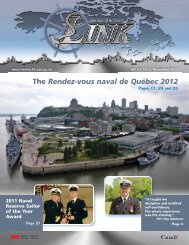You also want an ePaper? Increase the reach of your titles
YUMPU automatically turns print PDFs into web optimized ePapers that Google loves.
Exploitation <strong>of</strong> deep-sea ocean minerals is <strong>of</strong>ten strategically significant <strong>and</strong> that also raises <strong>the</strong><br />
political stakes surrounding <strong>the</strong>ir development. This is most obvious with regard to hydrocarbons,<br />
<strong>and</strong> some existing maritime disputes have been exacerbated when governments suspect or are<br />
certain that vast energy resources lie within disputed waters. <strong>The</strong> Sino-Japanese dispute in <strong>the</strong><br />
East China Sea is, for example, inflamed by Tokyo’s fear that Beijing will syphon <strong>of</strong>f Japan’s<br />
share <strong>of</strong> a large oil <strong>and</strong> gas field that straddles <strong>the</strong> two countries’ EEZs. 106 Developing deep ocean<br />
resources might be viewed by governments as a means <strong>of</strong> reducing a dependence on a foreign<br />
source that is viewed as a strategic vulnerability. Under a policy that was only ab<strong>and</strong>oned in<br />
early-2015, China’s use <strong>of</strong> its near-monopoly <strong>of</strong> <strong>the</strong> production <strong>of</strong> rare earth minerals as a<br />
diplomatic lever, with export restrictions used to signal displeasure to foreign governments, led<br />
Japan to consider <strong>the</strong> development <strong>of</strong> similar deposits within its EEZ, despite <strong>the</strong> high cost <strong>of</strong><br />
doing so. 107 Fur<strong>the</strong>rmore, <strong>the</strong> increasing importance <strong>of</strong> deep-sea resources might influence (perhaps<br />
even help precipitate) conflict on l<strong>and</strong>. Russia’s decision to seize Crimea from Ukraine in early-2014<br />
was not likely determined, but it might have been influenced, by <strong>the</strong> presence in Ukraine’s Crimean<br />
EEZ <strong>of</strong> oil <strong>and</strong> gas fields. 108 Moscow’s acquisition <strong>of</strong> <strong>the</strong>se resources has significantly reduced<br />
Kyiv’s domestic production <strong>and</strong> threatens to increase its energy dependence on Russia. Lastly,<br />
deep-sea mineral extraction has <strong>the</strong> potential to heighten inter-state competition, even in waters<br />
where tensions are relatively limited. A permit issued by <strong>the</strong> International Seabed Authority (ISA)<br />
in 2011 to allow Beijing to explore for deep-sea minerals <strong>of</strong>f <strong>the</strong> coast <strong>of</strong> Madagascar alarmed<br />
some Indian Ocean states already sensitive about Chinese naval activities in those waters. 109<br />
3.4 Seaborne Trade as a Security Issue<br />
<strong>The</strong> reliance on container traffic is a growing challenge to maritime security due to <strong>the</strong> difficulty<br />
presented by efforts to create an effective screening regime. If stowaways, some <strong>of</strong> whom are<br />
serving criminal or terrorist groups, continue to pose a major problem in <strong>the</strong> modern maritime<br />
trading system, in <strong>the</strong> post-9/11 world <strong>the</strong> vulnerabilities presented by reliance on containers are<br />
now seen as <strong>the</strong> greater danger. 110 Such concerns are not far-fetched <strong>and</strong> it is difficult to predict<br />
when <strong>the</strong>y will be overcome, if at all. We do know, however, that <strong>the</strong> “bad guys” <strong>of</strong> whatever<br />
stripe have been interested in using containers for illicit purposes in <strong>the</strong> past, <strong>and</strong> it is only logical<br />
to assume that <strong>the</strong>y still are. In August 2003, for example, reports emerged that a senior member<br />
106 Evans, “Enforcing Free Trade.”<br />
107 Cecilia Jamasmie, “China scraps decade-old rare earth export quotas”, Mining.com, 6 January 2015<br />
[accessed on 7 January 2014 at www.mining.com/china-scraps-decade-old-rare-earths-export-quotas-<br />
44322/]. See also Behr et al., “<strong>Maritime</strong> Security in a Multipolar World: Towards an EU Strategy for <strong>the</strong><br />
<strong>Maritime</strong> Commons”, p. 4 <strong>and</strong> Aless<strong>and</strong>ro Bruni, “<strong>The</strong> Sino-Japanese Dispute over <strong>the</strong> Senkaku Isl<strong>and</strong>s<br />
Highlights <strong>the</strong> Beginning <strong>of</strong> <strong>the</strong> end <strong>of</strong> China’s Rare Earth Monopoly”, Investorintel.com, 19 September 2012<br />
[accessed on 26 August 2014 at http://investorintel.com/r+are-earth-intel/<strong>the</strong>-sino-japanese-dispute-over<strong>the</strong>-senkaku-isl<strong>and</strong>s-highlights-<strong>the</strong>-beginning-<strong>of</strong>-<strong>the</strong>-end-<strong>of</strong>-chinas-rare-earths-monopoly/].<br />
108 This argument is made in Frank Umbach, “Energy was a Key factor in Russia’s Move on Crimea”,<br />
World Review (online), 23 June 2014. With regard to Crimea’s <strong>of</strong>fshore resources, see William J. Broad,<br />
“In Taking Crimea, Putin Gains a Sea <strong>of</strong> Oil Resources”, <strong>The</strong> New York Times, 17 May 2014, <strong>and</strong> Pavel Baev,<br />
“<strong>The</strong> Black Sea Dimensions <strong>of</strong> <strong>the</strong> Russia-EU Dialogue”, Paper presented at <strong>the</strong> 4 th Annual Energy <strong>and</strong><br />
<strong>the</strong> Black Sea Basin conference, Istanbul, 18 May 2005 [accessed on 11 September 2014 at<br />
www.prio.org/Publications/Publication/?x=385].<br />
109 Joel D. Adriano, “Deep-sea mining stirs risk concerns”, Asia Times, 5 August 2011.<br />
110 According to <strong>the</strong> International <strong>Maritime</strong> Organisation, between 1998 <strong>and</strong> 2011, 130,000 stowaways<br />
were found on ships. See Hoovestal, Globalization Contained, p. 77.<br />
24 DRDC-RDDC-2016-R085




